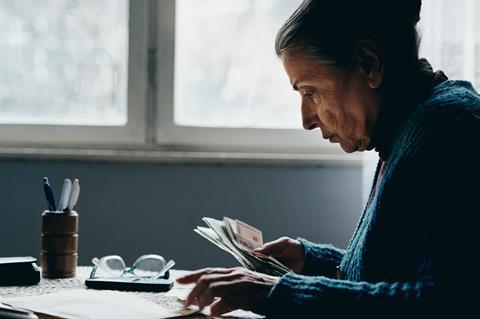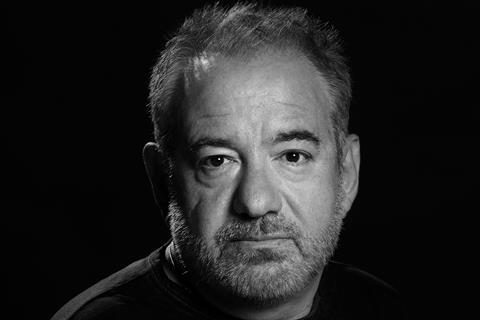
Gaining international prominence with his 2008 festival hit The World Is Big And Salvation Lurks Around The Corner, director Stephan Komandarev has continued to make both fiction and documentary features that address inequality and injustice in his native Bulgaria.
His 2017 film Directions – a drama about the experiences of various taxi drivers over the course of one night – premiered in Un Certain Regard, while 2019’s Rounds examined the work of the police over the course of a day and a night. The final film of this loose trilogy is Blaga’s Lessons, which world premieres on July 3 in Karlovy Vary’s Crystal Globe Competition.
Different in style to his two previous fiction features, the film is a dark and bitter story of the titular pensioner (played by Eli Skorcheva) who is the victim of a phone scam and loses her life savings. Faced with a society unwilling to help, Blaga must put her values to one side in order to survive.

The film is produced by Sofia-based Argo Film and co-produced by Bulgarian National Television and Germany’s 42Films. Sales are handled by Athens-based Heretic.
Was there a particular incident that sparked the idea behind Blaga’s Lessons?
For the third film [co-writer] Simeon Ventsislavov and I focused on a particularly vulnerable group - Bulgarian retired people. For both of us, this is the generation of our mothers and fathers. This generation was the real victim of the so-called “transition to democracy and market economy” that began in 1989. They literally paid for it with their health, their lives and their dignity. Miserable pensions, life in survival mode, loneliness because their children and grandchildren emigrated, lack of security and basic things for a normal existence.
Did you do a lot of research into these scams?
We researched for over a year and a half. We met many victims of phone scams - elderly people who gave their last saved money. We also spoke to police officers investigating these crimes. Finally, with the help of a famous Bulgarian journalist, we managed to meet with a real phone scammer. During our secret conversation, he described to us in detail his modus operandi, boasting about his biggest hits. At the end he bragged about the kind of prey that he and his colleagues rely on in their daily telephone rounds. It’s the money (usually around 1000 levs (€500)) which almost every Bulgarian pensioner hides in a book on their bookshelf. Money they’ve set aside for their funeral, so that they are not a burden to their children who are far away…
Can you tell us about the casting of Eli Skorcheva?
Eli Skorcheva was a real star in the 1980s in Bulgaria. When, after 1989, the invisible hand of the market reached cinema and theatre, as well as the spiritual and educational spheres in general, she decided to retire from her career. She made this decision consciously. She has worked for over 30 years in completely different professions. We met by chance, in a park in Sofia. The script was already ready. We managed to convince her to read it and to our great joy she agreed to return to Bulgarian cinema with this role. The 30 years of break had not affected her incredible acting capacity, she had managed to preserve her spiritual strength and presence.
Do you prefer to have a rehearsed and prepared style of filmmaking or do you like a more loose and improvisational approach?
Both of them. We have a long rehearsal process, rewriting the script and the dialogues with the actors. The cinematographer and the art director are also part of this preparation; together with the actors we shoot a lot of shots of the film beforehand. Because we have done a huge amount of our work during these rehearsals, we have the peace of mind and the freedom to improvise while we shoot. When we have already built a base, it gives us confidence and ease because we can always return to it.
As a person who critiques the powerful in society, do you think that has ever had a negative effect on you career, maybe by making funding difficult?
I have the freedom in my country to realize my ideas. The only disturbing thing is that there are voices and attempts to move towards a more commercial and entertaining cinema. While it also important to me that my films have large audiences, my heart is still connected to cinema as art and as exciting storytelling, as a moral sensor, and as a way to diagnose and change my country (and not only it) to a better and more just place.
What is your next project about?
It’s called Made in EU and is a feature film about exploitation in the garment industry in Bulgaria. There are many textile factories in our country that make clothes for the biggest European brands, clothes with “Made in EU” labels. The working conditions and payment of women who work in these factories are terrible and miserable.

























No comments yet